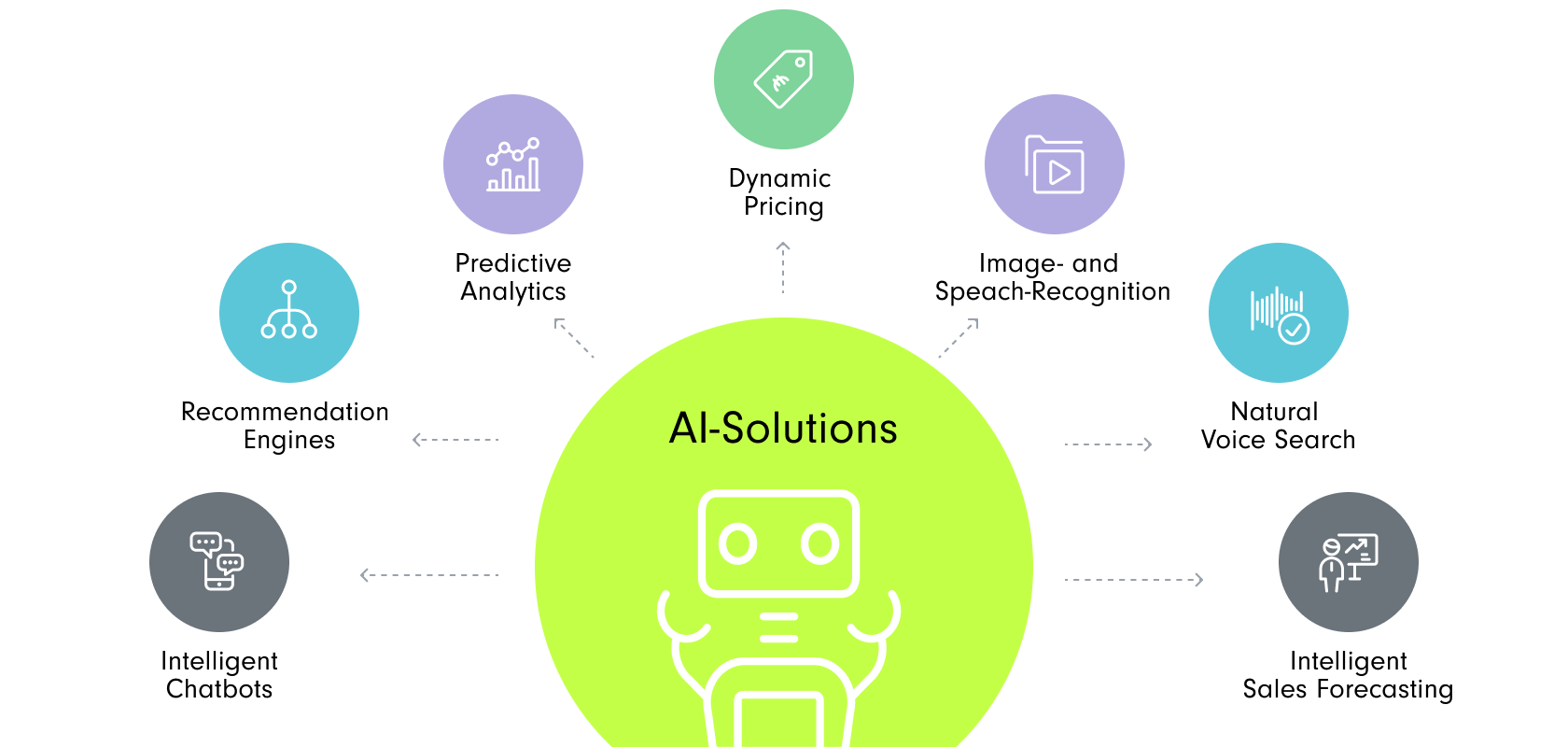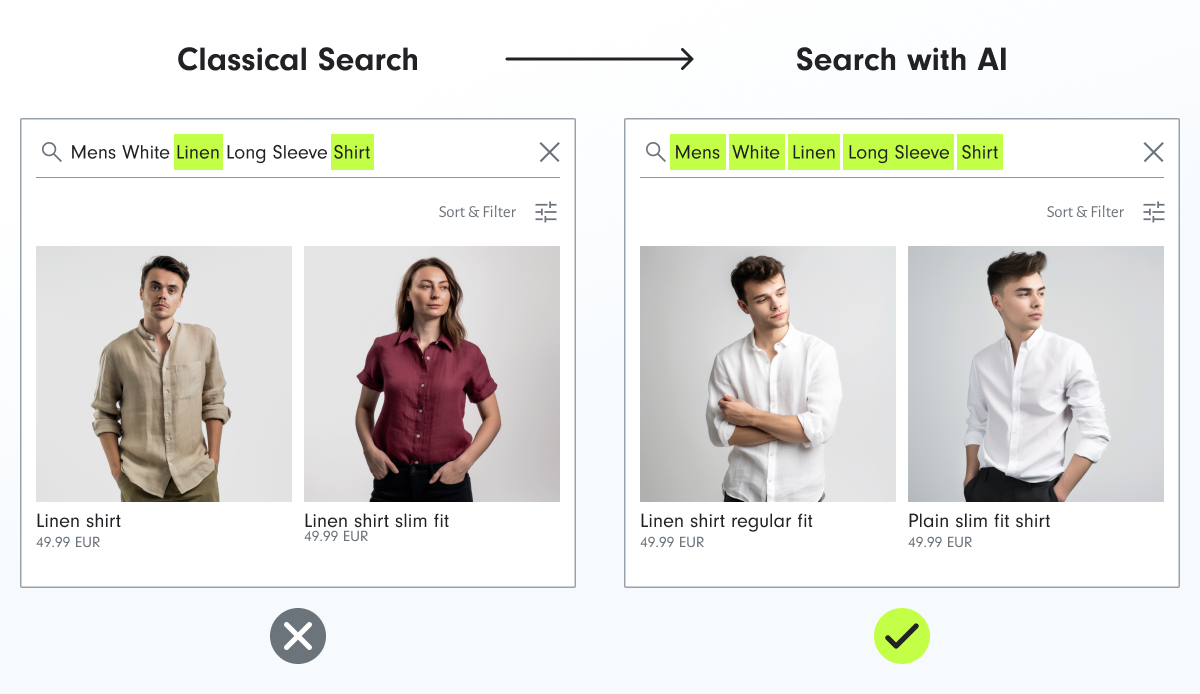In today's digital world, online sales are essential. But how can you navigate the ever-changing e-commerce landscape effectively? This is where AI comes in. With data overload, complex decisions, and the need for efficiency, AI efficiently manages data, provides valuable insights for informed decisions, and automates tasks to boost overall efficiency.
In this blog, our AI expert, Tomasz Gabryz, will delve deeper into some effective AI solutions in e-commerce and explain how they can positively impact your revenue.

Intelligent Chatbots
Effectively engage with your customers throughout their entire customer journey.
Enabling intelligent chatbots streamlines customer interactions, leading to increased satisfaction and efficient customer support.
This is how various intelligent chatbot solutions can help your businesses:
- Customer Support Chatbots: They handle common customer queries after purchase, ensuring a smoother post-purchase experience.
- Sales Chatbots: These bots offer basic product recommendations, elevating customer interaction and overall satisfaction.
- Knowledge Assistant AI: For companies presenting more complex offerings, a knowledge assistant AI is a valuable tool. This tool aids sales and customer service teams by swiftly providing crucial information, ensuring a more informed and efficient service.
- AI Assistant Bots: These versatile bots not only respond to customer inquiries but also serve as personal assistants, efficiently managing tasks like appointment scheduling and communication.
Natural Language Search
This AI solution can boost your shop's revenue by up to 10%

- The Result
Precise product suggestions, higher customer satisfaction, and up to a 10% increase in your shop's revenue.
Recommendation Engines
Can increase an online store's earnings significantly, often by 5% to 15%
Imagine an online store that always suggests products you love. It's not magic; it's the work of AI-driven recommendation engines.
These personalized recommendations can increase an online store's earnings significantly, often by 5% to 15%.
Recommendation engines work by analyzing user behaviour, item attributes, or a combination of both to provide personalized recommendations. These systems help users discover new products, content, or items of interest while enhancing user engagement and satisfaction with various online platforms like e-commerce websites, streaming services, and social media platforms.
Source: MacKenzie, I., Meyer, C., & Noble, S. (2013). How retailers can keep up with consumers. Retrieved from https://www.mckinsey.com/industries/retail/our-insights/how-retailers-can-keep-up-with-consumers
Depending on your business requirements, recommendation engines can be implemented using tools and platforms such as Recolize, Algolia, or Dynamic Yield. Alternatively, you can opt for a tailor-made solution specifically designed for your business.
Predictive Analytics
The "crystal ball" for your business
Predictive analytics is a branch of artificial intelligence that involves the use of data, statistical algorithms, and machine learning techniques to make predictions about future events or trends. It aims to forecast outcomes or customer behaviours based on historical data and patterns.
For example, an online shop may find that customers who buy sneakers often purchase running socks in the following days. With predictive analytics, the shop can predict that a customer who just bought sneakers is likely interested in running socks.
- The result? The shop can target this customer with ads for running socks, increasing sales opportunities.
Predictive analysis via AI has numerous applications across various industries, including finance, healthcare, manufacturing, and more. Some common use cases include:
-
Customer Churn Prediction: Identifying customers who are likely to leave a service or product and taking proactive measures to retain them.
-
Demand Forecasting: Predicting future product demand to optimize inventory and supply chain management.
-
Fraud Detection: Detecting fraudulent activities by analyzing transaction patterns and user behaviour.
-
Healthcare Diagnostics: Assisting in the early diagnosis of diseases by analyzing patient data.
-
Recommendation Systems: Suggest personalized content or products to users based on their preferences and behaviour.
-
Predictive Maintenance: Anticipating when equipment or machinery is likely to fail to schedule maintenance proactively and minimize downtime.
In essence, predictive analysis via AI leverages historical data and machine learning algorithms to make informed predictions, helping businesses make data-driven decisions, reduce risks, and improve efficiency in various domains.
Dynamic Pricing
An AI Tool to Keep You Competitive and Respond in Real-Time
Imagine you own a sunglasses store. AI can analyze data like weather, day of the week, demand, and competitor pricing, guiding you on when to adjust your prices. For instance, prices could rise when a sunny weekend is predicted but decrease when competing offers flood the market.
What advantages does such a tool offer?
- Optimized Revenue: By adapting prices to the current market conditions, businesses can ensure they consistently obtain the best price for their product or service.
- Competitive Edge: By aligning prices with the market, you maintain competitiveness and deter customers from seeking cheaper alternatives.
- Real-Time Responsiveness: AI facilitates instant responses to market fluctuations and customer preferences, a feat manual pricing cannot achieve.
An important note: If your operations are in Germany, it's crucial to adhere to legal and ethical guidelines related to dynamic pricing, especially concerning competition laws and data protection.
Image and Voice Recognition
Increase conversion rates by 5% to 20% or more
Imagine snapping a pic of shoes you like and getting instant product suggestions - that's image recognition. Or, skip typing and tell your device, "Show me red size 39 sandals" with voice recognition.
What are the benefits?
It's super easy for customers to search with images or voice, speeding up their shopping and making it more enjoyable. This boosts conversion rates, meaning more sales and revenue. Plus, if there is a chatbot that understands and answers questions in plain language, 24/7 saves a company time and cuts costs.
AI-Powered Sales Forecasting Tool
Optimize inventory management, resource planning & improve performance
In the world of e-commerce, accurately predicting sales is a common challenge.
Smart Sales Forecasting tools analyze past sales, current market trends, and external factors to deliver precise sales forecasts.
What does this mean for your business?
Well, it leads to optimized inventory management, efficient resource planning, and improved sales performance. Moreover, AI not only boosts efficiency but also enhances customer satisfaction by enabling you to better cater to customer needs and anticipate trends.
Here are some leading choices to enable Smart Sales Forecast:
- Salesforce Einstein: An advanced AI-driven analytics service.
- HubSpot: Offers robust analytics features for customer relationship management.
- Tableau: A top tool for data visualization and analysis.
- IBM Watson Analytics: Utilizes cognitive technology for data-driven insights.
As we conclude this exploration of AI's transformative role in e-commerce, it's evident that the potential for growth and efficiency enhancement is immense.
Embracing these AI-powered solutions empowers businesses to navigate the dynamic digital landscape with precision and cater to customers' evolving needs effectively.
The path to success lies in strategic planning, robust data infrastructure, and a commitment to ethical practices. The future of e-commerce is bright, driven by the limitless possibilities of artificial intelligence.
You are not alone!
We understand that venturing into the world of AI can be a daunting challenge for many companies. But you're not alone on this journey. If you have questions about this Blog or are wondering how can you leverage the power of AI tools in your e-commerce business, our AI experts are here for you.
During our initial consultation, we can delve into your specific challenges and identify the areas of your business that could gain the most from seamlessly integrated AI solutions.



%20(1680%20x%20950%20px).png?width=468&height=263&name=Lukas%20Broisch%20(300%20x%20175%20px)%20(1680%20x%20950%20px).png)
